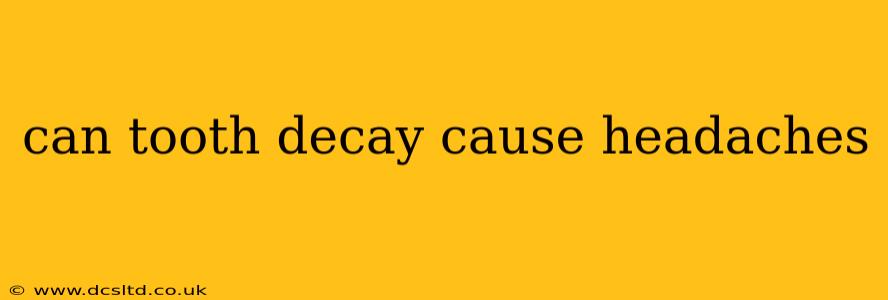Toothaches are notoriously painful, but did you know that seemingly unrelated symptoms like headaches can also stem from dental issues? Many people experience headaches, and while the causes are numerous, tooth decay is a surprisingly common culprit. This comprehensive guide will explore the connection between tooth decay and headaches, offering insights into the underlying mechanisms and providing guidance on what to do if you suspect a dental cause for your head pain.
How Can Tooth Decay Lead to Headaches?
The link between tooth decay and headaches isn't always immediately obvious. However, several pathways exist that explain this connection. Severe tooth decay, also known as cavities, can lead to a range of dental problems, each with the potential to trigger a headache:
-
Inflammation: Infected or decayed teeth trigger inflammation in the surrounding tissues. This inflammation can spread, affecting the nerves and muscles in your jaw, face, and even head, leading to tension headaches or even migraines. The body's response to infection is a significant factor in this pain referral.
-
Abscesses: A dental abscess is a pocket of pus that forms at the root of a severely decayed tooth. The pressure build-up within the abscess is excruciating and can radiate pain throughout the head, often manifesting as a throbbing headache.
-
Sinus Infection: Untreated tooth decay can sometimes spread infection to the sinuses, which are located just above the upper teeth. A resulting sinus infection can cause pressure and pain in the face and head, mimicking or exacerbating headaches.
-
Jaw Muscle Tension: Severe toothaches can cause you to clench or grind your teeth (bruxism), leading to tension in the jaw muscles. This tension can then spread to the head and neck, resulting in persistent headaches.
What Types of Headaches Can Tooth Decay Cause?
The type of headache associated with tooth decay can vary. However, the most common types are:
-
Tension Headaches: These are the most prevalent type, characterized by mild to moderate pain, usually felt as a tight band around the head. Tooth decay-related tension headaches often stem from jaw muscle tension.
-
Migraines: In some cases, severe tooth decay and related infections can trigger migraines, characterized by intense throbbing pain, often accompanied by nausea and sensitivity to light and sound.
-
Referred Pain: This is pain felt in one area of the body that originates from another. With tooth decay, the pain might be felt primarily in the teeth, but it often radiates to the head, ears, or neck.
Can a cavity cause a headache on the opposite side?
While most headache pain related to tooth decay is felt on the same side as the affected tooth, referred pain can sometimes be felt on the opposite side of the head. The complex network of nerves in the head and face can lead to this phenomenon, making diagnosis more challenging.
Can tooth decay cause a sharp headache?
Yes, tooth decay can cause sharp, shooting headaches, particularly if an abscess is present or if there is significant nerve irritation. This type of pain often indicates a more serious problem that requires immediate dental attention.
Does a toothache always cause a headache?
No, a toothache doesn't always cause a headache. Many people experience isolated tooth pain without experiencing head pain. However, severe toothaches, particularly those involving infection or abscesses, are more likely to trigger headaches.
How do I know if my headache is caused by a tooth problem?
If you suspect a dental issue is causing your headache, pay close attention to these factors:
- Location of the pain: Does the headache seem localized to one side of your head, near your jaw or teeth?
- Pain characteristics: Is the pain throbbing, sharp, dull, or constant?
- Other symptoms: Are you also experiencing tooth pain, jaw pain, swelling, or sensitivity to hot or cold?
- Relief measures: Does over-the-counter pain medication temporarily relieve the pain? (Note: This only masks the problem, it does not solve it).
If you're experiencing any of these symptoms, it's crucial to see a dentist for a thorough examination.
When to See a Dentist
Don't delay seeking professional help if you suspect tooth decay is causing your headaches. Early intervention is key to preventing more serious complications. See a dentist immediately if you experience:
- Severe toothache
- Swelling in your jaw or face
- High fever
- Difficulty opening your mouth
- Sensitivity to hot or cold that doesn't improve.
By understanding the connection between tooth decay and headaches, you can take proactive steps to address the underlying dental problem and alleviate your pain. Remember that self-treating is not recommended, and prompt professional dental care is crucial for resolving this issue effectively.
